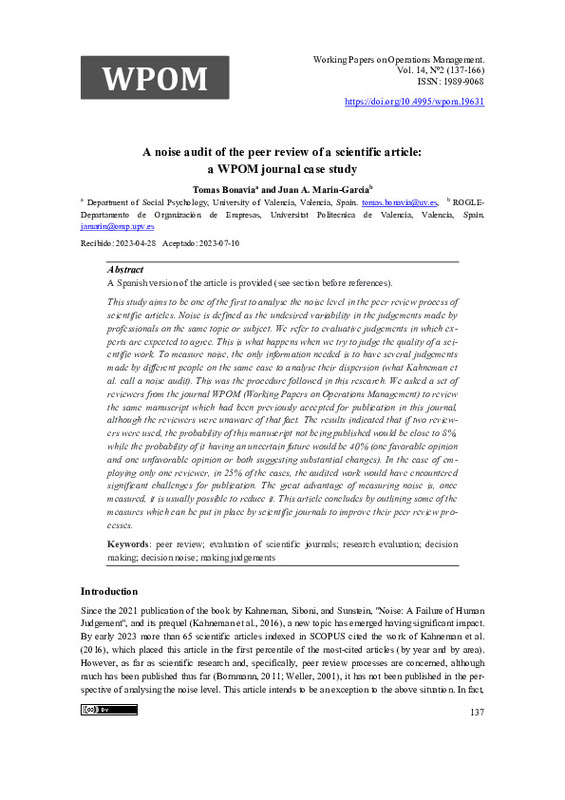Álvarez, S.M.; Maheut, J. (2022). Protocol: Systematic literature review of the application of the mul-ticriteria decision analysis methodology in the evaluation of urban freight logistics initiatives. WPOM-Working Papers on Operations Management, 13(2), 86-107. https://doi.org/10.4995/wpom.16780
Ariely, D. (2008). Las trampas del deseo. Cómo controlar los impulsos irracionales que nos llevan al error. Ed. Ariel.
Bedeian, A.G. (2004). Peer review and the social construction of knowledge in the management disci-pline. Academy of Management Learning & Education, 3(2), 198-216. https://doi.org/10.5465/amle.2004.13500489
[+]
Álvarez, S.M.; Maheut, J. (2022). Protocol: Systematic literature review of the application of the mul-ticriteria decision analysis methodology in the evaluation of urban freight logistics initiatives. WPOM-Working Papers on Operations Management, 13(2), 86-107. https://doi.org/10.4995/wpom.16780
Ariely, D. (2008). Las trampas del deseo. Cómo controlar los impulsos irracionales que nos llevan al error. Ed. Ariel.
Bedeian, A.G. (2004). Peer review and the social construction of knowledge in the management disci-pline. Academy of Management Learning & Education, 3(2), 198-216. https://doi.org/10.5465/amle.2004.13500489
Belur, J.; Tompson, L.; Thornton, A.; Simon, M. (2021). Interrater reliability in systematic review meth-odology: Exploring variation in coder decision-making. Sociological Methods & Research, 50(2), 837-865. https://doi.org/10.1177/0049124118799372
Benda, W.G.G.; Engels, T.C.E. (2011). The predictive validity of peer review: A selective review of the judgmental forecasting qualities of peers, and implications for innovation in science. International Jour-nal of Forecasting, 27(1), 166-182. https://doi.org/10.1016/j.ijforecast.2010.03.003
Bornmann, L. (2011). Scientific peer review. Annual Review of Information Science and Technology, 45(1), 197-245. https://doi.org/10.1002/aris.2011.1440450112
Ernst, E., Saradeth, T., & Resch, K. L. (1993). Drawbacks of peer review. Nature, 363(6427), 296. https://doi.org/10.1038/363296a0
Fiske, D.W.; Fogg, L. (1990). But the reviewers are making different criticisms of my paper: Diversity and uniqueness in reviewer comments. American Psychologist, 45(5), 591-598. https://doi.org/10.1037/0003-066X.45.5.591
Hirst, A.; Altman, D.G. (2012). Are peer reviewers encouraged to use reporting guidelines? A survey of 116 health research journals. PLoS ONE, 7(4), e35621. https://doi.org/10.1371/journal.pone.0035621
LeBreton, J.M.; Senter, J.L. (2008). Answers to 20 questions about interrater reliability and interrater agreement. Organizational Research Methods, 11(4), 815-852. http://orm.sagepub.com/cgi/content/abstract/11/4/815 https://doi.org/10.1177/1094428106296642
Kahneman, D. (2012). Pensar rápido, pensar despacio. Ed. Debate.
Kahneman D.; Rosenfield A.M.; Gandhi L.; Blaser T. (2016). Noise: How to overcome the high, hidden cost of inconsistent decision making. Harvard Business Review, 94(10), 38-46.
Kahneman, D.; Sibony, O.; Sunstein, C.R. (2021). Ruido. Un fallo en el juicio humano. Ed. Debate.
Krippendorff, K. (2011). Computing Krippendorff's alpha-reliability. Retrieved from https://repository.upenn.edu/asc_papers/43
Marin-Garcia, J.A.; Santandreu-Mascarell, C. (2015). What do we know about rubrics used in higher education? Intangible Capital, 11(1), 118-145. https://doi.org/10.3926/ic.538
Moher, D.; Liberati, A.; Tetzlaff, J.; Altman, D.G.; PRISMA Group (2009). Preferred reporting items for systematic reviews and meta-analyses: The PRISMA statement. Annals of Internal Medicine, 151(4), 264-269, https://doi.org/10.7326/0003-4819-151-4-200908180-00135
Rezaei, A.R.; Lovorn, M. (2010). Reliability and validity of rubrics for assessment through writing. As-sessing Writing, 15(1), 18-39. https://doi.org/10.1016/j.asw.2010.01.003
Voskuijl, O.F.; Van Sliedregt, T. (2002). Determinants of interrater reliability of job analysis: A meta-analysis. European Journal of Psychological Assessment, 18(1), 52-62. https://doi.org/10.1027//1015-5759.18.1.52
Weller, A.C. (2001). Editorial peer review: its strengths and weaknesses. Ed. American Society for In-formation Science and Technology.
[-]









